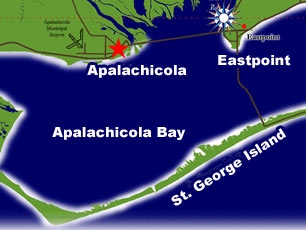 The oystermen working the waters of the Apalachicola Bay in Florida are having a hard time making their living with the declining flow of freshwater to the region. Without the flow of freshwater, the estuary cannot support the delicate balance of life that has sustained watermen and their families for generations. The central issues of the debate are nothing new. Since the late 1990’s Florida, Alabama and Georgia have been debating their rights and the balance of common usage of shared waters.
The oystermen working the waters of the Apalachicola Bay in Florida are having a hard time making their living with the declining flow of freshwater to the region. Without the flow of freshwater, the estuary cannot support the delicate balance of life that has sustained watermen and their families for generations. The central issues of the debate are nothing new. Since the late 1990’s Florida, Alabama and Georgia have been debating their rights and the balance of common usage of shared waters.
At the heart of the current debate is the amount of water being held back in the U.S. Army Corps of Engineers’ management practices at Lake Lanier which is on the Chattahoochee River in Georgia. Watermen living in Florida’s gulf-side mid-panhandle town of Apalachicola Florida report that Georgia’s persistence of blocking water upstream is choking the life out of the Bay. The lack of nutrients and increased salinization is directly contributing to the death of oysters and absence of spawning fish. To watermen whose livelihoods and town economies are caught in the debate, the situation is becoming dire.
Florida Governor Rick Scott (R) announced his plans to sue the state of Georgia in the U.S. Supreme Court over Georgia’s refusal to release water upstream and for obstructing the natural water flow which is threatening the health of the Apalachicola Bay. The courts refused to step into the dispute a year ago, so the Governor is gearing up for another round of convincing the Supreme Court to hear the case.
On the other side of the argument is Georgia’s governor, Nathan Deal (R) who has indicated that he proposed a compromise for usage over a year ago and never received an official response from Florida. He has indicated his preference to keep the dispute out of the courts. At the present time, Alabama is not named in the dispute.
What is most troubling to watermen and their neighbors living in the communities sustained by the Apalachicola Bay is a simple fact that transcends political rhetoric and long-term court disputes. The life in the Bay is declining in a clearly document-able way and if something is not done to bring more fresh water to the Bay, it is in danger of crossing a threshold from which there can be no return.
To support Atlanta’s growing metropolitan population the state of Georgia allows withdrawals of approximately 360 million gallons of water a day from the Chattahoochee River. Because of the expected population growth in the Atlanta region, by 2035 the draw is expected to reach 705 million gallons of water per day. To put that number into perspective, the future draw from the Atlanta region is expected to equal or surpass the entire current volume of Apalachicola Bay.
The governors of Florida and Georgia, as well as Alabama, have all expressed the desire to come to agreeable terms regarding the long-term management of shared water for recreational, agricultural, industrial and other uses. Whether or not those agreements will take place with or without the assistance of the courts and in enough time to return the natural balance to the Apalachicola Bay remains to be seen.
References:
http://www.reuters.com/article/2013/08/13/us-usa-florida-oysters-idUSBRE97C0YR20130813
http://www.bna.com/florida-asks-us-n17179875817/
http://www.bloomberg.com/news/2013-08-13/florida-to-sue-georgia-in-u-s-supreme-court-over-water.html
http://www.gainesvilletimes.com/m/section/6/article/88138/








